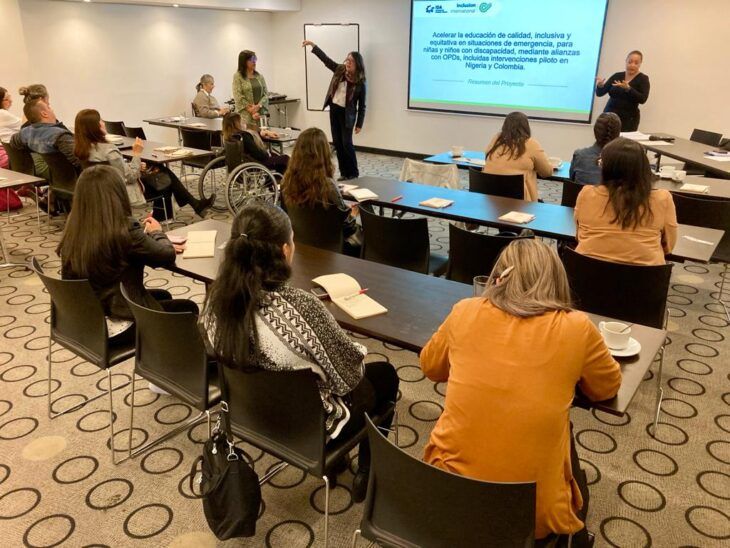Blog
Paving the way for inclusive education in emergencies
- Inclusive education
- Africa
- The Americas
Emergencies like wars, disasters, and pandemics put millions of children out of school. Children with disabilities – who are 49% more likely to never attend school at all – are even less likely to have access to quality education in emergency situations.
Despite children with disabilities often being excluded from education in emergencies, organisations of persons with disabilities (OPDs) with the expertise to make sure inclusion happens are not usually included in the planning or delivery of these humanitarian programmes.

Responding to this gap, the International Disability Alliance (IDA) and Inclusion International are pleased to announce their work on a new project that aims to improve access to inclusive education for children with disabilities in emergency situations.
This project was made possible through funding from Education Cannot Wait (ECW)’s Acceleration Facility – a funding pool designed to address systemic barriers to education in emergencies.
Yasmine Sherif, Executive Director of Education Cannot Wait, explained why this project was funded, “By supporting the identification and analysis of existing barriers to education for children with disabilities, Education Cannot Wait’s Acceleration Facility grant to the International Disability Alliance will address systemic bottlenecks facing children with disabilities to enrol in and advance their learning in emergencies and protracted crises.”
Education Cannot Wait’s Acceleration Facility grant to the International Disability Alliance will address systemic bottlenecks facing children with disabilities to enrol in and advance their learning in emergencies and protracted crises.
Yasmine Sherif, Executive Director of Education Cannot Wait
“Through such funding, we are expanding our reach to children with disabilities so they can receive the inclusive quality education they need and deserve in a safe, supportive environment,” said Yasmine.
Led by II and IDA as global OPDs leading the fight for inclusive education, this project brings together OPDs at the local, national, and regional level to bring the voices of people with disabilities to the forefront in emergency planning.
The project will work in two countries: Niger and Colombia. Asdown Colombia in Colombia and La Fédération Nigérienne des Personnes Handicapées (FNPH) in Niger will work with IDA and II to lead the on-the-ground work in their countries.
By working in Colombia and Niger to link OPDs with other stakeholders, create resources and tools, and remove barriers, this project is all about making the systems in place for education in emergency situations more inclusive for girls and boys with disabilities.
IDA and II are working to create long-lasting solutions for inclusive education in emergency situations in Niger and Colombia, and to design ways of working that can work in emergency situations around the world.
Project Goals
The project’s activities in Niger and Colombia will work towards four main goals:
- Help organisations of persons with disabilities (OPDs) get involved – The project will make sure that OPDs who support the inclusion of persons with disabilities have the right knowledge and skills to do this work in emergency situations.
- Bring together OPDs and humanitarian organisations – Directly link and build connections between OPDs and the organisations that help in emergencies. Better collaboration and helping them learn from each other can make emergency education efforts more inclusive for everyone.
- Work with big humanitarian projects to test ways to remove barriers – Work with Multi-Year Resilience Programmes (MYRP) in Colombia and Niger to test new tools and ways of working. These collaborations will help us learn what works, and help remove barriers to accessing inclusive education in emergencies through these programmes.
- Share important knowledge with humanitarian organisations worldwide – Make sure people who help in emergencies around the world know how to include girls and boys with disabilities by sharing what we’ve learned. This means providing them with useful information and influencing how they do their work to be more inclusive.
IDA and Inclusion International’s Roles
As a leading global expert on inclusive education, Inclusion International will manage the project and be the technical expert for this work.
IDA, as a global alliance of organisations representing persons with disabilities, will provide crucial support and engagement from the wider disability movement.

Looking ahead
Worldwide, 1 child in 10 has a disability – and most of these are in low and middle-income countries where emergencies and crises are more likely to occur.
This project will help make sure that these children with disabilities are not left behind by creating a roadmap for how to remove barriers and make sure real collaboration happens between OPDs and humanitarian organisations.
Maha Khochen-Baghshaw, ECW’s thematic lead on inclusive education and disability inclusion stated, “For too long, decisions about the education of children with disabilities have been made for, rather than by and with, them.”
For too long, decisions about the education of children with disabilities have been made for, rather than by and with, them
Maha Khochen-Bagshaw, Education Cannot Wait
“I am thrilled to support this project that endeavours to not only listen and make the voices of persons with disabilities and their organisations heard, but also ensure they are equipped with the necessary knowledge and tools to contribute to the humanitarian-development-peace nexus as essential partners throughout every stage of an intervention,” said Maha Khochen-Bagshaw.
The lessons and resources that come from this project, built on the knowledge of OPDs and voices of people with disabilities, will help to make access to education in emergency contexts more inclusive across the world.